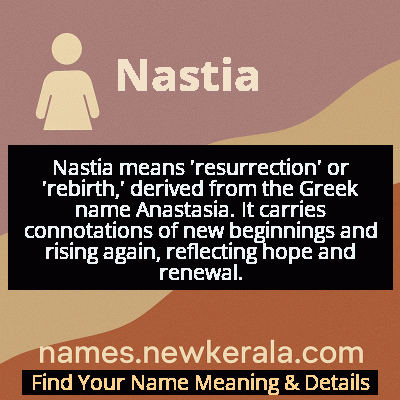Nastia Name Meaning & Details
Origin, Popularity, Numerology Analysis & Name Meaning of Nastia
Discover the origin, meaning, and cultural significance of the name NASTIA. Delve into its historical roots and explore the lasting impact it has had on communities and traditions.
Name
Nastia
Gender
Female
Origin
Greek
Lucky Number
1
Meaning of the Name - Nastia
Nastia means 'resurrection' or 'rebirth,' derived from the Greek name Anastasia. It carries connotations of new beginnings and rising again, reflecting hope and renewal.
Nastia - Complete Numerology Analysis
Your Numerology Number
Based on Pythagorean Numerology System
Ruling Planet
Sun
Positive Nature
Leaders, ambitious, highly driven, self-reliant, innovative.
Negative Traits
Overly aggressive, domineering, impatient, selfish.
Lucky Colours
Red, orange, gold.
Lucky Days
Sunday.
Lucky Stones
Ruby, garnet.
Harmony Numbers
2, 3, 9.
Best Suited Professions
Entrepreneurs, managers, engineers.
What People Like About You
Courage, determination, leadership.
Famous People Named Nastia
Nastia Liukin
Olympic Gymnast
2008 Olympic all-around champion and 5-time Olympic medalist
Nastia Poleva
Singer
Influential Ukrainian rock musician and cultural icon
Nastia Khmara
Actress
Prominent Ukrainian television and film performer
Name Variations & International Equivalents
Click on blue names to explore their detailed meanings. Gray names with will be available soon.
Cultural & Historical Significance
The name carries echoes of Russian imperial history through Grand Duchess Anastasia Nikolaevna, the youngest daughter of Tsar Nicholas II, whose mysterious fate following the Russian Revolution created enduring fascination. Throughout the 20th century, Nastia maintained its cultural relevance in Eastern Europe while gradually spreading to Western countries through immigration and cultural exchange. The name represents a bridge between ancient Christian traditions and modern Slavic identity, embodying both religious heritage and contemporary cultural expression.
Extended Personality Analysis
Individuals named Nastia are often perceived as resilient and adaptable, reflecting the name's meaning of 'resurrection.' They typically demonstrate strong emotional intelligence and intuition, allowing them to navigate complex social situations with grace. Nastias are known for their creative problem-solving abilities and often possess artistic or athletic talents that they develop from a young age. Their personality combines traditional values with modern sensibilities, making them equally comfortable in conventional and progressive environments.
Many Nastias exhibit natural leadership qualities tempered with empathy, enabling them to inspire others while maintaining genuine connections. They tend to be determined and persistent when pursuing goals, yet maintain a playful, approachable demeanor that draws people to them. The name suggests a balance between strength and sensitivity, with individuals often showing remarkable capacity for both personal achievement and meaningful relationships. This combination of traits makes Nastias particularly effective in careers requiring both technical skill and interpersonal finesse.
Modern Usage & Popularity
In contemporary usage, Nastia maintains moderate popularity in Eastern European countries while gaining recognition internationally, particularly through high-profile athletes and artists. The name experienced a surge in interest following Nastia Liukin's Olympic success in 2008, introducing the name to broader Western audiences. While not ranking in the top names in English-speaking countries, it appears with increasing frequency in multicultural urban centers and among families with Eastern European heritage. The name's appeal lies in its exotic yet accessible sound, combining traditional roots with modern brevity. Current naming trends favoring shorter, distinctive names have contributed to Nastia's steady usage among parents seeking names that are both culturally rich and contemporary.
Symbolic & Spiritual Meanings
Symbolically, Nastia represents transformation and renewal, drawing from its root meaning of resurrection. The name embodies the concept of rising above challenges and emerging stronger from adversity. It carries connotations of grace under pressure and the ability to reinvent oneself while maintaining core identity. In metaphorical terms, Nastia symbolizes the cyclical nature of life—endings that lead to new beginnings and the perpetual possibility of personal growth. The name suggests a bridge between tradition and innovation, honoring heritage while embracing progress. It represents the idea that beauty and strength can coexist, much like the delicate yet resilient flowers that often symbolize rebirth in various cultural traditions.

